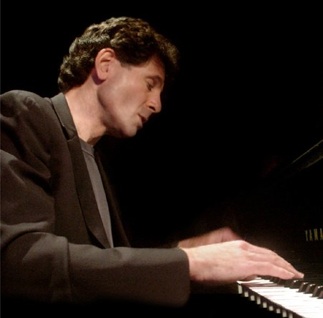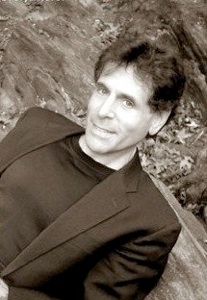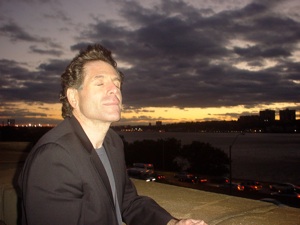Louis Landon’s name might not be familiar to you yet, but you may have heard his music. His recently-released second solo piano CD, “Peace Revolution!” has been in the Top 10 on the New Age Reporter charts for the past two months and is receiving great reviews. Landon has toured all over the world as a sideman and has composed music for film, video, and commercials. He is a career musician who has experienced the ups and downs that come with that lifestyle and is a colorful personality who is on a mission of peace. I think you’ll enjoy our chat.
Louis Landon was born in Yonkers, NY, the oldest of three brothers. He spent his first eight years in New York, and then his family moved to Studio City, CA. Louis’ mother was a housewife who worked as a bookkeeper and office manager when the opportunities arose. His father was a pianist, arranger, bandleader, conductor, actor, and cartoon character voice artist. Both of Louis’ brothers are musical, and one is a professional guitarist and vocalist.
Louis took piano lessons from the ages of 5-13, and returned to the piano in college. He played bass clarinet in his junior high band and began learning the guitar at fourteen. He has been concentrating on his own solo piano music since the release of his first solo piano CD, “unwind,” in 2005. Louis has been married for twenty years and has two daughters, Skye (18) and Brooke (16). (A full bio is on his website, listed below.)
KP: How old were you when you started improvising?
Landon: I tried to pick out melodies on the piano at the age of four, and would sometimes just sit and pretend I knew how to play. Real improvising began when I started guitar at fourteen. That filtered over to the piano where I started playing blues and rock tunes.
KP: How old were you when you wrote your first song?
Landon: I was fifteen when I started composing on the guitar. One of my first songs, "Rennie Rode," was picked up by Sandler and Young. My father was their musical director and played the song for them. They liked it and recorded it - definitely positive feedback!
KP: When did you know that you wanted to be a professional musician?
Landon: I knew after my first year at SUNY and changed my majors to composition and arranging.
KP: Did your parents object?
Landon: My parents were expecting me to go to college. They didn't want me to pursue music because they knew firsthand from my father’s experiences how difficult that path is.
KP: Who or what have been your biggest musical influences?
Landon: I would have to say that my father was my biggest influence. He played a lot of piano when I was growing up. He was totally self-taught, but knew a lot about music and theory from listening and playing. Other major influences have been Herbie Hancock, Chick Corea, Keith Jarrett, and McCoy Tyner, not necessarily in that order.
KP: What inspired you to start composing your own music?
Landon: I think it was the need to express myself. I also like the experience of creating music. One minute there is nothing, and the next minute there is a piece of music. It's a wonderful experience to create art.
KP: Have you done any composing for films and TV?
Landon: I have composed music for film, video, and commercials. I was the Vice-President of Music Production for Ross Enterprises in NYC before starting my own music house. I wrote the music for all of the National Basketball Association's “Best Plays and Bloopers” commercials for three years.
KP: Was that music piano and keyboard or orchestrations?
Landon: Most of the music I did was MIDI. I had one of the first MIDI studios in NYC, and it really helped me land jobs because I could do them quickly and priced reasonably.
KP: Was it fun scoring the basketball bloopers?
Landon: I did enjoy the music I scored for the NBA commercials. Some of it was hard work, though. Sometimes Paul Gilbert, who did the video, wanted something different from what I had provided. He knew what he wanted and he usually got that from me.
KP: What has been your most exciting musical moment or experience so far?
Landon: I've had so many amazing musical experiences - too many to go into - but I would have to say that one of the high points in my life was in a small town in Mexico. I was traveling to Belize with some guys to go diving. One night, we stopped at a big dance hall. My cousin had his guitar and I had a little Melodica (a keyboard instrument that you blow into). We met the leader of a Mexican band, and he saw our instruments. Between our poor Spanish and his poor English, we decided to play together on a big stage overlooking about five hundred couples dancing. We jammed for about two hours. I was trading lines with the sax player on my Melodica and the crowd was going crazy. We couldn't speak to each other with words, but the communication in the music was amazing.
KP: You have been a professional musician virtually all of your adult life. Were there a lot of hard times, or has it been a good way to make a living?
Landon: I have definitely paid my dues in this business. I have literally gone hungry for my art. I was in one band who lived on a box of frozen chicken that was left over from a BBQ where we played. That's all we had to eat all week, and we were also having trouble paying the rent. It was bad. I also lived the life of a poor artist around Boston. I was playing a lot, but made very little money. I was living in a real dump of an apartment, but I had no choice in the matter - I had to follow my dream. When it was good, it was really good. I toured with Baryshnikov and Company during the summers from 1983 to 1986. (I was supposed to go out in 1987, but the tour was canceled at the last minute due to Misha's knee surgery.) Touring with Mikhail Baryshnikov was the highest level of touring I have ever experienced. We had our own plane and limos took us to the plane. It doesn't get much better than that! I double-dated with Misha, too. Along with the four summer tours with Misha, we did a few weeks in Japan and an AIDS benefit performance in Paris for Francois Mitterand other French dignitaries. So, I've experienced some of the best and worst times that music has to offer.
KP: What was your job when you toured with Baryshnikov?
Landon: Basically, I covered all the orchestral parts and the conductor, Paul Connelly, played the piano. It was a small ensemble and we had to sound like an orchestra. We were one of the first touring units to integrate MIDI into performance.
KP: With such a varied career in so many genres of music, what brought you back to solo piano?
Landon: It’s funny how that happened. I was rehearsing with Pucho and His Latin Soul Brothers at a studio in the home of architect Paul Hirsch. He had a Kawai piano there and was recording the rehearsal just for fun. Afterwards, he called me over and told me to listen. I was knocked out by the piano sound that he had and told him that I wanted to record a solo piano CD there. I went back a month or so later with the intention of recording a jazz CD, but for some reason, every time I tried to record the tunes I went in there with, the music would slow down and I would get caught up in the sound of the piano. Paul did this thing with the temperature and the humidity, and the piano would start to sing. I just went with it, and in no time I had a new age CD recorded. Everything was very down- tempo - kind of the opposite of my crazy life. It was my way to go somewhere calm and peaceful.
KP: Do you still play a lot of jazz?
Landon: Not anymore. I pick up some gigs here and there, but I don't live and breathe jazz like a lot of the players I play with. I don't practice and play that stuff day in and day out. To be a jazz player is to be constantly listening and stretching the limits of harmonic knowledge and rhythm. For me, there came a point when I realized that that was not me. I wanted to simplify and was no longer interested in how complex my chord voicings were or how far out I could go playing 3 against 4 and still be able to keep that all together over a song form. It wasn't me.
KP: You have a couple of concerts coming up with David Nevue and the Whisperings group. Where are they?
Landon: I am playing a concert with David Nevue in Spring Valley, NY on May 3. It is not an "official" Whisperings concert, because it is just the two of us. The Whisperings concert is in York, PA on May 7 and features David Nevue, Jace Vek, Greg Maroney, and me.
KP: What a lineup! I wish I could be there! Is there a particular philosophy that you try to convey in your music?
Landon: I am on a peace mission. My personal mission statement is to create a peaceful world by writing, recording, and performing music from the heart.
KP: Are there any specific pieces that you feel say the most about who you are as a person?
Landon: I would have to say “Peaceful” from my first CD, “unwind,” and “Peace Revolution!” from my new album, as they are the subjects of my mission.
KP: Do you have any favorites of your pieces?
Landon: That would have to be “Camelot” on “Peace Revolution!” - a new, more neoclassical direction for me.
KP: How much of “Peace Revolution!” is improvised?
Landon: There is improvisation in all of the tracks on the CD, but it varies from piece to piece how much is improvised. “Impromptu,” which was tagged onto the CD as an epilogue, came out of a 25-minute improvisation in the studio, and was actually pieced together. (It’s the only edited track on the CD - everything else was recorded as played.) “Elegant Lady” was composed and recorded on the spot. The rest of the pieces were composed before going into the studio. Some of them were from my "Joyous Spirit" CD.
KP: Do you play your own compositions about the same each time or are they constantly evolving?
Landon: I play most of my pieces differently every time I play them because of the room for improvisation. Only recently have I begun to compose pieces that do not include improvisation.
KP: Do you write out your music or just keep it in your head?
Landon: Most of my music is in my head. There are times when I write something down because I don't want to forget it. It might be a chord progression or a specific melody. Occasionally, I will record something in order to remember it. I don’t keep a sequencer or my hard disc recorder on for that purpose, though. I do most of my composing on my "real" piano, a 1926 Steinway O that is in need of some regulation and voicing. It’s fine for playing and practicing, though.
KP: When did you start studying martial arts?
Landon: I started doing Tae Kwon Do in my 20's. I got my green belt and started sparring with pads when I saw someone break his wrist. I told the other guys in my band about it and they said, "Hey, if that happens to you, we're all out of a job." So that was the end of karate back then. In my 30's I did some Tai Chi, but that really didn't satisfy me or make me feel that I could handle myself in a difficult situation. Several years later, I was playing a gig with Richie Morales, a drummer who is on my CD, "The Gershwins, Cole Porter, & Me." I saw him muscling around a box that looked pretty heavy. I said something about him being in shape, and he told me he was doing karate. I decided to get back into it and set the goal of getting my black belt. Little did I know what that would entail.
KP: How long did it take?
Landon: It took me about 5 1/2 years of serious training. I had to do some pretty hardcore fighting against guys who were bigger, stronger, younger, and more experienced. I took a lot of pain! It's Kyokushin karate with some Krav Maga, grappling, and Muay Thai. Kyokushin karate was the first full contact sparring school - very practical and extremely dangerous. They used to go full contact with no protection. When sparring, I always wear headgear, mouthpiece, shin guards, and 18 oz. boxing-type gloves. I want to be sure that nothing ever happens to my fingers, and after about seven years, nothing has. I am no longer training hard, just keeping in shape a few times a week.
KP: How does fighting coincide with your philosophy of peace?
Landon: It's kind of the same idea as “Peace Revolution!” Is a revolution possible if it is peaceful? I think it's possible but highly unlikely, unfortunately. In the same way, I think it is possible to be a peaceful warrior. Ultimately, the goal is to NOT fight, but to have skills for disarming and defusing a negative situation. As black belts, we pledge to use the skills defensively to protect ourselves and to help others along with having humility, honesty, integrity, courtesy, and harmony. Almost all of the self-defense techniques we learn are to be used only after we have been physically attacked.
KP: Back to music! Who are your favorite composers?
Landon: In jazz, that has to be Herbie Hancock. His "Dolphin Dance" is a contemporary masterpiece. I don't use the word genius lightly, but Herbie is a genius. When he was playing with Miles Davis in his 20's, he was playing solos that were light years ahead of anyone else. And speaking of geniuses, that title also has to go to J.S. Bach. What planet did he fly in from? That guy was so advanced and his work is still amazing to me. There is also Wayne Shorter, John Coltrane, Jobim, Duke Ellington, George Gershwin, Cole Porter, Lennon and McCartney, James Taylor...the list goes on...
KP: Who are your favorite performers?
Landon: When I think of performers, I think of people who are larger than life onstage. I remember standing next to Bruce Springsteen at a backstage party and being shocked to see that he was shorter than me - and I'm not tall. The way he took command of the stage and jumped up on a piano and on a big speaker box, I could have sworn he was eight feet tall! Keith Jarrett also comes to mind, but in a different way. I wish he would tone down his orgasmic sound effects, but I would have to call him a genius. His solo improvisations are outstanding.
KP: Do you have any hobbies?
Landon: Who has time for hobbies these days? The only thing I continue to do is my martial arts workouts, which started as a way to stay in shape and turned into a passion. I used to have a greenhouse and tended a 2,500 square foot organic garden. I grew tons of vegetables. I used to own horses and rode with my kids a lot. I'm a certified PADI advanced open water diver and lived in Bermuda where I went diving every day. My other hobby is investing. Do you think I could afford my lifestyle as an indie artist only?
KP: If you could have any three wishes, what would they be?
Landon: Can I have four, please?
1. world peace
2. dismantling the military industrial complex and terminating its control of the U.S. government
3. jail time for all government officials who are responsible for getting the U.S. into an illegal war and the occupation of Iraq
4. Oprah having me on her show and endorsing my solo piano CDs
KP: Do you have any words of advice for young people who are studying music now?
Landon: I would say to learn as much as possible. Read well. Study as many styles as possible. Be able to go out and play music in any situation, and play it well and with feeling. Then I would say, know yourself and learn how to express yourself through your own music. Say something meaningful. True art requires the artist to put something of him/herself into the creation and to have that creation touch people in some way that moves them emotionally, spiritually, and/or physically. A favorite example is a Rembrandt self portrait I used to visit at the Frick museum in NYC. He put something alive into that painting, and his spirit will live forever in it. Even though Rembrandt is long dead, he taught me something. That, to me, is the highest form of art imaginable.
To learn more about Louis Landon and to hear samples of his music, visit
his website or his
Artist Page here on MainlyPiano.com.
Photos courtesy of Janis Wilkins.Kathy Parsons
April 2008



